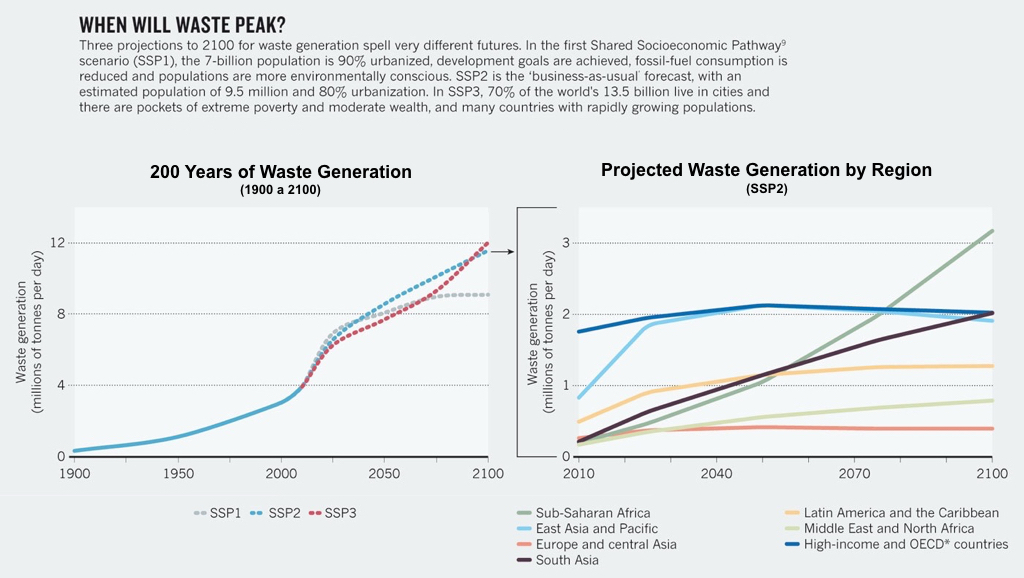“Through a move towards stable or declining populations, denser and better-managed cities consuming fewer resources, and greater equity and use of technology, we can bring peak waste forward and down. The environmental, economic and social benefits would be enormous.”
Dan Hoornweg, Perinaz Bhada-Tata and Chris Kennedy, Authors of “Waste Production Must Peak This Century”
The habits of consumers and the rising demand for new products is becoming a serious problem due to the ever-increasing amount of waste that is polluting and degrading the planet’s ecosystems.
A new report from the World Bank’s Urban Development department forecasts a 70% global increase in urban solid waste by 2025, rising from more than 3.5 million tons per day in 2010 to more than 6 million tons per day by 2025. If improvements aren’t made to both the mechanisms and the entire global infrastructure of waste management, this amount will increase to over 11 million tons per day by 2100.
 Source: Nature (2013)
Source: Nature (2013)
Major cities around the world, especially in developing nations, are already coping with burgeoning populations, scarce financial resources and a limited capacity to manage environmental issues. Yet they are still facing a rising cost for waste management $205 billion ever year today to $375 billion in 2025.
This is unsustainable, not only for the countries facing these extraordinary costs but also for the environment that suffers on a daily basis from dangerous waste management. Back in 2013, Mexico City’s Bordo Poniente and Shanghai’s Laogang rubbish dumps were receiving more than 10,000 tons of waste per day. This causes unprecedented levels of pollution due to soil contamination and methane gas release. By no means a new problem, cities are adopting new and improved methodologies that will mitigate the impact our waste has on local ecology and the environment.
Mexico City, one of the most crowded and overpopulated cities in the world, announced an ambitious “Zero Garbage” Plan for the Management of Solid Wastes in 2013. This will use composting, recycling and transformation to reuse the nearly 13,000 tons of solid waste that the city produces every day. Today, Mexico City is repurposing and reusing 40% of its garbage, which means 4,800 tons of waste are recycled instead of being dumped in landfills.
Thanks to new methods of solid waste treatment, Mexico City is currently turning organic waste into compost, producing 700 tons of compost every day that is used by farmers to raise vegetables. The city also processes 2,000 tons of recyclables, including paper, plastics and aluminum. Trash Compressing Plants, transform inorganic waste products into an alternate fuel source that can be used in cement factories. The City’s goal is to reach 100% total sustainability in waste processing by the 2018.
It is yet to be seen whether the results of the programs currently being implemented in Mexico and other developing countries will be sufficient to change the overall numbers of urban waste management. For this reason, overall sustainability in the products we consume, from production to packaging, will need to be addressed.
One way you can help save the environment and reduce waste is to opt for sustainable products that are packaged with recyclable materials. Opting for these products produces 73% less air pollution than if they were made from raw materials. One recycled tin can would save enough energy to power a television for three hours. One recycled glass bottle will save enough energy to power a computer for 25 minutes. One recycled plastic bottle would save enough energy to power a light bulb for thee hours.
The good news is that change is happening right now. The newer generations are more aware that in the act of being consumers, the most powerful and effective products and cosmetics are those that are environmentally friendly.